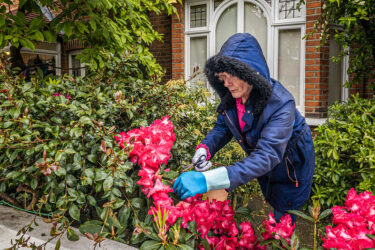Horticulture therapy is a comforting way to deal with the isolation and restrictions imposed by the coronavirus pandemic, experts say.
Home gardening is trending as more people are taking to it to occupy time, seek self sustainability and to ease concerns over food security.
Leks Maltby, a gardener and a manager with Sheridan Nurseries in Toronto, said there was a spike in the sales of soil, seeds and plants after the province declared its lockdowns last year.
Sales quadrupled as people who have never tried gardening were buying all kinds of gardening items, Maltby said.

A customer buys gardening soil at a hardware store March 1 during the pandemic, as stores are allowed to re-open in Munich. Gardening has boomed since COVID-19 forced the lockdown of communities. Photo credit: REUTERS/Andreas Gebert
He said the demand for herbs, seeds and plant rose because of perceived food insecurity and because of hedging plants for the garden as everyone staying at home and trying to grow evergreen trees to block out neighbours.
“Gardening is a good vocation as breathing in fresh air is very healthy and positive, you can get vitamin D from sun and most importantly you can get as far away from the digital world,” Maltby said.
Jade Paxton, a gardener and manager with Silver Creek Nursery in Wellesley, Ont., west of Kitchener, agrees the boom in gardening is driven by extra idle time, higher stress levels and a growing concern over food security.
She said the nursery saw a massive increase in sales both this year and last year following the onset of COVID-19.
“During this social turmoil gardening and being outdoors has a positive effect on people, it provides them a sense of purpose, a sense of control and growing plants that produce food, provides a sense of comfort and security knowing that you are somewhat self-reliant,” Paxton said.
“Gardening and horticulture also has therapeutic use as working with plants is calming and enjoyable and easy to get lost in the work like weeding,” she said. “Working outdoors is also safer because it is more conducive to physical distancing while still being able to chat with people.”
Martin Laidla, a manager with Click & Grow Nurseries based in Estonia and is a distributor of seeds and plants worldwide especially in the U.S. and Canada, said food plants have seen boom in sales because of health and food availability reasons.
“Purchases for gardening gear and seeds and smart indoor gardens soared starting from last spring and here are many reasons, people started to care more about their health, fresh produce was scarce in many places and connection with nature like gardening is very relaxing and mindful activity,” Laidla said.
A number of studies found gardening provides horticulture therapy comforting for psychiatric health, including a Princeton University report that found gardening to be as therapeutic as biking, walking and offers emotional well-being.

A woman prunes flowering plants in her garden. Gardening has boomed since the pandemic forced lockdowns, and fills the time and provides mental wellbeing, according to research. Photo credit: Flickr & John Kelly
Gardening during the pandemic does provide mental and physical benefits, said Nancy McLean, a faculty of Agriculture and assistant dean in the Department of Plant, Food and Environmental Sciences at Dalhousie University in Halifax.
She said working with soil, plants and being outside provides a welcome change from time spent before a computer or television screen.
“Another reason people turned to home grown vegetable gardening during pandemic is related to a concern over food shortages issues with the supply chains,” McLean said.
Fellow Dalhousie agriculture professor Lord Abbey agreed as gardening provides horticulture therapy when people are stuck at home during the pandemic. Engaging in horticultural activities or landscaping promotes well being, helps ease mental and physical health issues
“More people are gardening during pandemic due to therapeutic reasons, food shortages are a part of it not the main issue,” Abbey said.
The Canada Food Prices Report 2021 suggests an increase of nearly three to five per cent in overall food prices is expected, with the most significant increases predicted for bakery, poultry and vegetables.
This means Canadian families will pay nearly $700 more in groceries compared to 2020 as food prices skyrocket amid pandemics.
A report prepared by Dalhousie shows one in five Canadians said the pandemic influenced their decision to start growing food at home.
More people are now growing some home produce in their yards or balcony over challenges of finding specific foodstuffs from the grocery store.
“Key reasons more people started gardening during lockdown (are) to fill their time and as an opportunity to have their kids involved in activities as they were not actively engaged in sports or school,” said Andrew Hammermeister, associate professor with the Plant, Food and Environmental Sciences Department at Dalhousie.
